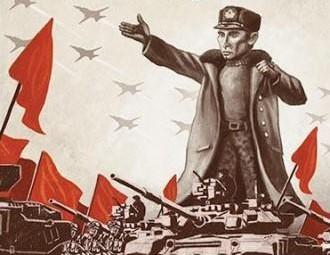Aliaksei Karol: Wars have always been the means of Russia’s strengthening in the world arena

Kremlin has lost Ukraine, without which the establishment of strong great imperial Russia is impossible.
Crimean war awakened chauvinism in Russia, and Putin’s approval rating sharply raised to 75 per cent. But in its desire to establish a new world order, Russia doesn’t see that it is fiddling while Rome is burning.
Why is Russia asserting itself at the expense of war? Where are the sources of Russian chauvinism? What is meant by “historical justice” of Crimean’s occupation? The answers to these questions EuroBelarus Information Service gets from Aliaksei Karol, editor-in-chief of the weekly Novy Chas.
- It is the fourth war that Russia is fighting over the 22 years after the USSR broke up. Does it mean it can assert itself only through wars with the neighbors and occupying foreign territories?
- Starting from the moment of the establishment and throughout history, Russia has been rejecting other forms of development. Wars and force have always been the means of Russia’s strengthening in the world arena.
After the first attempt to become a democratic state, Russia, heated by Ukrainian conflict, has violated the Potsdam peace, and that outlined the threat of new Cold War.
After incorporation of Crimea Russia got on the list of countries that establish the course of history. Putin is present in the world arena as the strong persona, his name is heard everywhere. But even now it is obvious that it is not a strong empire that is trying to play the role of big political power in the world arena but some regional state, the economics of which is based on oil and gas proceeds.
System of international relations established at Potsdam Conference and affirmed by Belavezha Accords is undermined, as the basis of non-violation of borders is undermined. Russia is reassuring itself as an infamous leader. According to the analysis of former Putin’s counselor Andrey Illarionov the period of stagnation is changing to the decadence period. And the celebration of Crimea’s annexation is fiddling while Rome is burning.
- Unlike the three former wars, the war in Crimea is against the fraternal Slavonic nation. For many years the propaganda has been trying to din the thought that Belarusans, Russians and Ukrainians are fraternal nations into our people. Does it mean that the Slavonic fraternity comes to an end?
- The fraternity has come to an end within the Soviet and post-Soviet, democratic ideology. It is important to remember that hatred is roused very easily to destroy the trust. Let’s hope that the distrust that is already disseminated will pass with time; and ties of relationship and trust, which are broad, will help to oppose the war, hatred against Ukraine which is stirred up by Russian propaganda.
- Where does this Russian chauvinism come from?
- I won’t say that only Russians are chauvinists; this feature is typical for the countries that fight against each other. The disease is especially catching for the youth. Thus, patriotic hysteria marked the start of World War I. Indeed, it is a disease of the society, of human relationship, which come from the biological nature (fight for territory), but is supported and cultivated only through political slogans. I believe that this disease can be treated – we only need political will for that.
- Why does Kremlin need another burden? They say Alaska is collecting signatures for joining Russia, too. In both cases Russians talk about the restoration of “historical justice”. But we, Belarusans, might as well lay claims to return Smolensk or Vilnius… Is there any hidden historical motive in the launch of Crimean war?
- There is hidden historical motive in the Russia’s actions in Crimea. It is an imperial tradition united with the political demands as seen by Putin. He staked on Ukraine, on Yanukovich as a president to keep the country within the Russian influence area.
However, Putin lost twice: in 2004 and in 2013-2014. Putin has lost Ukraine, without which the establishment of strong great imperial Russia is impossible.
After that a new plan appeared – a small victorious war. And this small war awakened chauvinism, and Putin’s approval rating sharply raised to 75 per cent. However, this success is but temporal – Putin has lost the whole Ukraine.
But Kremlin set a signal that all territorial disputes can be resolved in a middle-age way. Under this logic, we can put a question about the return of Konigsberg to Germany, and the return of Far East to China…
- Can Belarus become the next country which Russians will choose to defend the Russian-speaking population?
- This problem exists in the long-term prospective; however, it is not a burning issue. For now Putin got the required level of allegiance from the Belarusan authorities. If Lukashenka tries to violate the established borders, he will be replaced, and Belarus will be incorporated in Russia, all the more that we have the fresh example - the Northwestern Krai, which existed up to 1917. It is a dangerous situation for the establishment of Belarus’ sovereignty and for Lukashenka as the carrier of state authority.
-
03.01
-
07.10
-
22.09
-
17.08
-
12.08
-
30.09








































